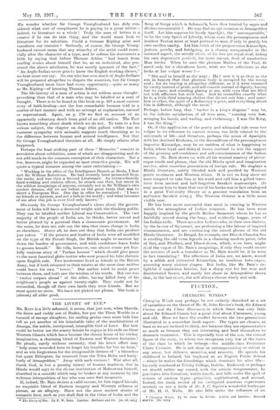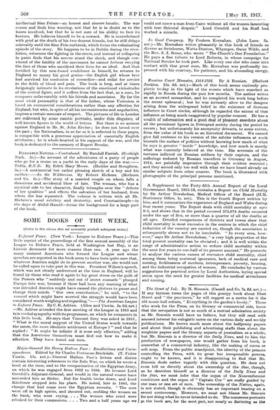FICTION.
CHANGING WINDS.*
Changing Winds may perhaps be not unfairly described as a set of variations on the theme of Mr. St. John Ervine's book, Sir Edward Carson and the Ulster Movement, in which there was very little about Sir Edward Carson but a great deal about Ulstermen, young and old. Here we have the conflict between the two generations illustrated in a somewhat fresh aspect. Tho types are chosen, at least so we are inclined to think, not because they are representative so much as because they are interesting and lend themselves to dramatic treatment. This is especially true of the son, the central figure of the story, in whom one recognizes very few of the traits of the class to which he belongs—tho middle-class Protestant Ulster Unionist. Ho is not dour or uncompromising or robust in any sense, but delicate, sensitive, and neurotic. He spends his childhood in Ireland, his boyhood at an English Public School. —where ho makes the friendships which dominate his after life— his early manhood at Trinity College, Dublin. Endowed, or perhaps we should rather say cursed, with the artistic temperament, ho gravitates into literature, writes novels, and falls under the spell of women of various types—primitive, sophisticated, and normal. Indeed, the frank recital of his variegated amorous experiences reminds us not a little of Mr. J. C. Squire's wonderful burlesque of Mr. H. G. Wells. He also falls under the influence of an • Changing Winds. By St. John G. }:nine. Dublin and London : Manned and CO. tea. net.]
intellectual Simi Feiner—an honest and sincere fanatic. The war comes and finds him wanting, not that he is in doubt as to the issues involved, but that he is not sure of his ability to face its horrors. He believes himself to be a coward. Ho is overwhelmed with grief at the death of his two dearest friends, but he still delays miserably until the Sinn Fein outbreak, which forms the culminating episode of the story. He happens to be in Dublin during the revo- lution, witnesses the fighting in the street, and instead of collapsing in panic finds that his nerves stand the shock, and though con- vinced of the futility of the movement he cannot forbear envying the fate of those who sacrificed their lives for an ideal. And thus fortified by this now-found confidence in himself, he returns to Reglan.d to marry his good genius the English girl whose love had survived his confession of cowardice—and enlist for service in the fields of blood and pain. The book is long, and at times fatiguingly intimate in its revelations of the emotional vicissitudes of the central figure, and it suffers from the fact that, as a man, he compares unfavourably with his friends and associates. By far the most vivid personality is that of the father, whose Unionism is based on commercial considerations rather than any affection for England, but who, in spite of all his inconsistencies and angularities, inspires a certain measure of respect. The pictures of life in London are enlivened by some caustic portraits, under thin disguises, of well-known figures in the world of letters. But there is no animus against England in Mr. St. John Ervine ; he does not brood over the past ; his Nationalism, in so far as it is reflected in these pages, is compatible with a generous appreciation of essentially English attributes ; he is whole-hearted in his support of the war, and the book is dedicated to the memory of Rupert Brooke.



























 Previous page
Previous page